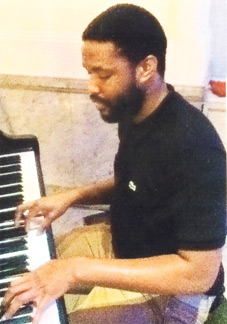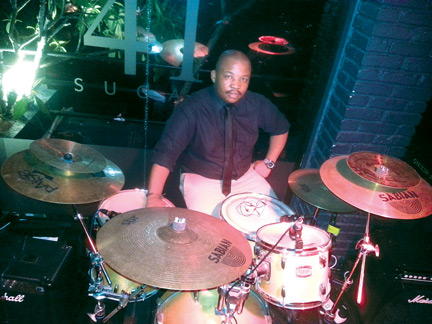Playing in Lanka has been a beautiful experience - Nathi
By Mahes Perera
The mention of South African music will spring to mind the names of
Miriam Makeba, Naomi Wachira, Laurie Levine, Vusi Mahlahela – dubbed the
Voice of South Africa and perhaps the Soweto String Quartet. There are
many more no doubt who are in the spotlight and many others who share a
lesser degree of the spotlight. Music to the South Africans is a natural
thing, to them its like how the proverbial duck takes to the water.
|

Pianist – Nkosinathi Mathunjwa |
Here in Sri Lanka we were fortunate to meet the South African band
Mzansi whose leader was the vocalist Xolisa Kgomotso Mamaila and
appreciate their creative music which was on an attractive throbbing
pulse beat of the drums. Before the ensemble flew back to Johannesberg
after a year of playing in Sri Lanka we met the pianist Nkosinathi
Mathunjwa and the drummer Xolane Ngwenya to learn more about their world
of music.
Question: It is an accepted fact Nathi that music is in the
blood that runs through your veins if you are South African born, so
could you share with us as to how your career as a pianist started, for
you to be in the limelight as you are today?
Answer: My father actually was the one who pushed me to take
to playing the piano – the keyboards – as a pastime. As time went by I
became fascinated in knowing I could play the keyboards, to the delight
of my father. I really fell in love with the instrument and was happy I
mastered it that I decided to go to college for further studies in
music. I started hanging around with my college fellow students, learnt
to compose music and started getting gigs.
Q: As a young talented musician was it difficult for you to
break in as a regular pianist?
A: Yes. There are quite a lot of talented players and all are
experienced. So it wasn't easy for me as a youngster to break in. It
took some time, until they could trust that I could handle the music.
Looking back now I've been playing professionally for 22 years. I
started off with a group called Native Rhythms. They were established
musicians and I was like a ‘filling in’ musician, free lance as they
call it. With the passage of time I became a regular pianist.
Q: Pianists generally study to play the violin or flute as a
second instrument how was it with you. Were you able to master a second
instrument?
A: I would love to play the saxophone. It has a strange
fascination for me. But I haven't gone into that area. I can play drums
just a bit, but piano has been my favourite instrument and it will be my
favourite instrument forever. When I check the music before a gig the
sound I fall in love with is the guitar.
Challenge
Q: Do you play for concerts and shows? Are you booked for
cabarets and performances of such nature?
A: Not on a regular basis. However, an artiste will give me
his music for a show and we would rehearse it. I enjoy the challenge of
sight reading, it enhances your confidence and you are kept on your
toes.
Q: All musicians have their influences who were your pianist
influences from the South African scene and even the American scene?
A: From South Africa its definitely Bheki Mseleku. He's
amazing and then there's Carl Sheppard and Andike Yenana. From the
American scene my first mention is Thelonius Monk, then Mulgrew Miller,
Barry Harris and Keith Jarrett. When you listen to Keith Jarrett playing
he has a way of getting into you and with my gospel background I get
totally absorbed by the progression of his music.
Q: Do you incorporate African folk tunes into your music?
A: Yes, I do. I have a couple of my compositions but I haven't
be able to find time to sit down and record them. We have a lot of music
from our country that's why we concentrate on our music. The
contemporary pop ballads, I play them for myself, for my pleasure. I
haven't got any gigs where I'm expected to play that kind of a
repertoire. In South Africa we play original music.
Q: Some musicians are of the opinion that the music you hear
today is totally different from the sounds you heard, in the 50s to the
70s – like the big band sounds of the swing and modern era and that it
will not last long. What is your comment?
A: I think there are certain sounds that won't last. But on
the other hand there are sounds that will last. Times have changed. We
don't like to stick to the old sounds. We'd like to express ourselves
with a fresher sound. Today there are many youngsters who are doing it.
But in my opinion the traditional sounds won't fade away.
|

Drummer – Xolane Ngwenya. |
Q: You and the band Mzansi have been playing here in Sri Lanka
for about a year now. The band first performed at the Colombo Hilton,
then moved over to Qbaa and after that to Sugar. How did you enjoy
playing in Sri Lanka.
A: It's been a wonderful experience. So different from South
Africa. I learnt to play cover music and I learnt a lot from your
bassist Alston Joachim and pianist Kumar de Silva. They are extremely
good musicians and I am happy I got to know them so well. We leave this
month and we hope we could be back soon. We take back with us happy
memories of interaction with Sri Lankan musicians.
The drummer in the band Mzansi is Xolane Ngwenya who started playing
the drums as a hobby. He met a friend through his older brother, a lead
guitarist who saw the potential in him and Xolane started working with
them as a drummer before going to the university to obtain a diploma in
jazz and popular music. At the university they not only teach the
technique in playing drums but as Xolane said they take you into the
intracies of surviving in a conflicting music world.
Q: Quite naturally, the question of your influences cannot be
left out, so could you tell us how you started off in South Africa to
enjoy a career as a drummer?
Church
A: In South Africa there's a guy called Ringo he's a vocalist
and was a percussionist before. I listened a lot to his music, I loved
his arrangements and since I come from a Christian family, the Church
was the best thing and that's where I started.
There's a gospel group called Joyous Celebrations and my interest in
music grew from them. I have a friend who is currently the drummer for
Joyous Celebrations and it was people like them who pushed me into
becoming a drummer. As soon as I got to university I was introduced to
Jack de Johnette – a modern drummer. There's also a crazy drummer called
Thomas Priget. I used to also visit the drummers’ centre that's where
you see the likes of Steve Gadd and Dennis Chambers.
Q: As a drummer did you have the occasion to play with big
bands or orchestras in South Africa?
A: I had the opportunity to play with an orchestra called
Miagi, located in Pretoria. Whether I play in a big band or a small
ensemble it is of no consequence to me. I love a challenge and in
anything that's challenging I go for it.
Q: Are you a stickler for playing in rehearsed gigs or do you
enjoy impromptu sessions and what's your comment on the present music
scene?
A: I've done many unrehearsed gigs. I can fit in easily in an
impromptu session and I certainly enjoy them. As for the present music
scene it may not be everybody's cup of tea but we cannot be stuck in the
music of the past. We have to move forward, go along with the new things
which I call modern jazz – before it was something else, now it's
something else, something new termed funk. |

